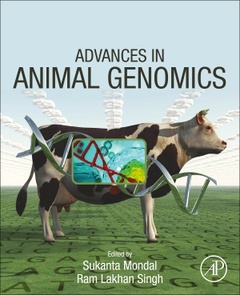Advances in Animal Genomics
Coordonnateurs : Mondal Sukanta, Singh Ram Lakhan

Advances in Animal Genomics provides an outstanding collection of integrated strategies involving traditional and modern - omics (structural, functional, comparative and epigenomics) approaches and genomics-assisted breeding methods which animal biotechnologists can utilize to dissect and decode the molecular and gene regulatory networks involved in the complex quantitative yield and stress tolerance traits in livestock. Written by international experts on animal genomics, this book explores the recent advances in high-throughput, next-generation whole genome and transcriptome sequencing, array-based genotyping, and modern bioinformatics approaches which have enabled to produce huge genomic and transcriptomic resources globally on a genome-wide scale.
This book is an important resource for researchers, students, educators and professionals in agriculture, veterinary and biotechnology sciences that enables them to solve problems regarding sustainable development with the help of current innovative biotechnologies.
2. From Gene to Genomics: Tools for improvement of animals
3. Transgenesis in Animals
4. Transgenic poultry
5. Stem cell technology and its application
6. Next Generation Sequencing and its application
7. RNA sequencing: A revolutionary tool for transcriptomics
8. Targeted genome editing: A new era in molecular biology
9. RNAi for livestock improvement
10. Microbial metagenomics
11. Embryo cloning
12. Molecular markers and its application in animal breeding
13. Genomic selection in animal breeding
14. Recombinant DNA technology
15. Gene therapy
16. Nanotechnology in animal production
17. Genome based vaccines
18. Bioinformatics in animal genomics
19. Ethical aspects and public perception
Professor Ram Lakhan Singh is Vice-Chancellor of Nilamber-Pitamber University, Medininagar, India. He held position of Professor and Chair of Biochemistry at Dr. Rammanohar Lohia Avadh University, Ayodhya, India prior to joining this assignment. He has 31 years of experience as teacher and 39 years as researcher in the area of Environmental and Nutraceutical Biochemistry. Professor Singh published more than 87 research papers, written 17 book chapters and edited 6 books published by Springer, CRC and Elsevier. He guided 25 PhD students and has been invited as editorial board member of International journals. He has been awarded IUTOX Senior Fellowship in 2007 and admitted to the Fellowships of the Society of Toxicology in 2011 and Academy of Environmental Biology in 2015.
- Integrates basic and advanced concepts of animal biotechnology and presents future developments
- Describes current high-throughput next-generation whole genome and transcriptome sequencing, array-based genotyping, and modern bioinformatics approaches for sustainable livestock production
- Illustrates integrated strategies to dissect and decode the molecular and gene regulatory networks involved in complex quantitative yield and stress tolerance traits in livestock
- Ensures readers will gain a strong grasp of biotechnology for sustainable livestock production with its well-illustrated discussion
Date de parution : 12-2020
Ouvrage de 328 p.
21.4x27.6 cm
Thèmes d’Advances in Animal Genomics :
Mots-clés :
AFLP; Alternative transcriptome and the future of genome biology; Alzheimer's disease; Animal biotechnology; Animal genomes; Animal health; Animal production; Apoptosis; Biopharmaceuticals; Bioprospection; Bioreactors; Biosafety guidelines; Bombyx mori; Carbon-based nanoparticles; Cell death; Cell signaling; Characterization of alternative transcription start and polyadenylation (ATS and APA) sites; COI; Computational mapping; Conventional breeding; CRISPR Gene editing; CRISPR-Cas9Gene editing techniques; Demographic history; Dendrimers nanoparticles; Dicer; Disease tolerant livestock; DNA barcode; DNA sequencing; DNA signature; Drug development; Endometritis; Exon; Extremophiles; Fertility traits; Food; Functional genomics; Gene therapy; Genes; Genetic improvement; Genetic make-up; Genome editing; Genome sequence; Genome; Genomic breeding value; Genomics; Genomicselection; Histone proteins; Homologous recombination; Human genome project; India; Induced pluripotent stem cells; Intron; IPR; MAS; Mesenchymal stem cells; Metagenomics; Microsatellites; Minisatellites; Molecular network; Molecularmarker; Nanobiotechnology; Nanotechnology; Neurodegenerative diseases; Next- and third-generation sequencing; NGS platforms; Parkinson disease; Pathogenesis; Phenome; Physical map; Quantum dots nanoparticles; RAPD; Read alignment; Recombinant DNA technology; Regenerative medicine; Regulatory RNA molecules; RFLP; RISC; RNAinterference; RNA-Seq workflow; Sequencing techniques; shRNA; Signaling pathways; Signaling receptor; siRNA; SNP; Somatic and germline therapy; Species-specific-barcode; TALENs; Targeted gene editing; Testis xenografting; Therapeutic cloning; Therapeutic targets; Transcriptome analysis; Transgenic animal; Transgenic livestock; Translational value; Transposable elements; Umbilical cord blood; Unculturable microorganisms; Viral and nonviral vectors; Whole transcriptome start site sequencing (WTSS-Seq)Whole transcriptome termini site sequencing (WTTS-Seq)ZFNs



